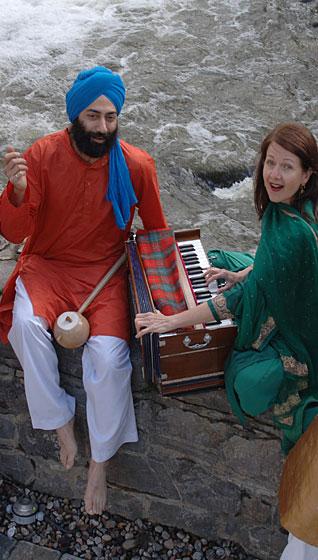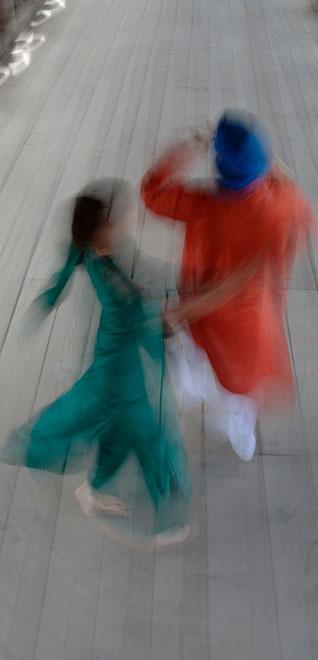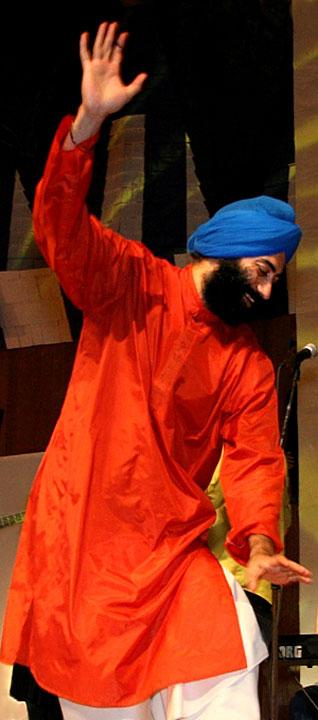Music
Galitcha:
A Musical Tapestry
by DON WILCOCK
"You were sick, man!"
Kuljit Singh Sodhi laughs about the comment now, but when the teenager first blurted it out to him last year at the Old Songs Festival, the turbaned leader of the Punjabi folk music group, Galitcha, wasn't at all sure how to take it.
"I was actually....what's the expression, dumb.....?
Dumbfounded, I coach him. "Dumbfounded, yes. Suddenly the other people said, 'It was really great. I like the mix you guys have.' Then, I understood. I think I know, okay, what this was about."
Cultural diversity is the watchword this weekend [June 27-28], as many scores of artists from around the world take part in the 29th Annual Old Songs Festival at Altamont Fairgrounds [Altamont, New York], Friday through Sunday. From Appalachian balladeer Elizabeth LaPrelle & The Fruit Dodgers to the English folk song duo John Roberts & Tony Barrand, this renowned event puts the emphasis on tradition with an incredibly large array of workshops and mini-concerts that have the artists and the attendees rubbing shoulders with one another with an intimacy that's unique even in a field known for such interaction.
Kuljit Singh emigrated from Punjab to Montreal with his family when he was 10. His father had fought in the Indo-Pakistan war in '69 and was a CID inspector. "That's like the CIA," explains Sodhi. "The guy he was going to replace was assassinated."
If, like me, your only familiarity with the sub-continent's music is Ravi Shankar, you won't feel out in left field with Galitcha, which translates as "tapestry."
Indeed, the rest of the group is composed of non-Sikh Canadians, and though Kuljit plays the dholki and toombi and sings in his native language, Chris MacLean sings in English and plays guitar and harmonium. Linsey Wellman plays flutes and sax, and Shawn Mativetsky has played the tabla for 17 years.
Kuljit was used to the slapping sound of a tabla that he likens to African drumming. "Shawn stays away from that for some technical and expert reasons, but in Punjabi style, you do actually need some of that because it's about that pizzazz, that fun bling. So, he's been learning over the years to do some of that."
That's right, Galitcha's sound is not at all stuck in a classical motif. And most interestingly, it's Kuljit's multi-cultural smorgasbord background as much as his varied Canadian band mix that drives that diversity.
When he and his parents arrived in Canada with basically the clothes on their backs, they had to live in an immigrants' section of Montreal where he heard a lot of Greek music. Disco was popular at the time, and he says that the glitzy nature of that genre felt right at home for a child who had seen a lot of Bollywood films in India.
A chance meeting with the late Pakistani devotional singer Nusrat Fateh Ali Khan in the early '80s brought Kuljit back to his Punjabi roots.
"Magazines back in the '90s put him (Nusrat) as the voice of the century. Basically, a Qawwali singer (which is) sort of gospel of the Sufi world of Pakistan and India. Qawwali style is the very rhythmic praises of God, the Beloved or the Loved One. That's the style he had."
Coming full circle, Kuljit has been listening to Pete Seeger, the folk patriarch he sees as the American equivalent in stature to Nusrat Fateh Ali Khan.
Like Seeger's best songs, Punjabi music has a rich heritage in protest, stemming from the tragic Partition of Punjab and the accompanying independence of the sub-continent from the British.
When I mention that Seeger might find welcome compatriots within the Sikhs, Kuljit says, "You're actually giving me goose bumps by telling me that. (Protest) is a big tradition especially within the Sikh community, because Sikhs were actually brought up with a new religion founded 500 years ago, rejecting Hindu beliefs and practices. And, it revolted against the tyrannical Mughal rulers of northern India."
Kuljit sees music as the antidote to racism, which he says is as rampant in India as it is in North America, and he sees kids like the one who thought his music was "sick" as being the key to breaking down the barriers of prejudice.
He's looking forward to this weekend and reconnecting with one young "crew cut WASP" struggling with alcoholic parents. The teenager promised to help him prepare Punjabi food at the festival, and Kuljit Singh plans to give him a drum set.
[This piece is the edited version of the original published in The Troy Record.]
June 28, 2009






